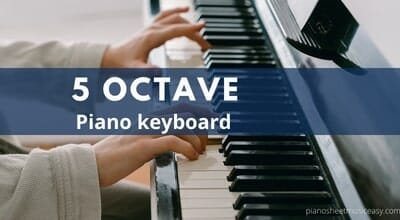A five octave keyboard is perfect for a beginner. You will not be able to play the full range of piano and organ patches without fiddling with controls, but that is a minor consideration. Anything less than 61 keys has better portability but less tonal range.

I would like to do a survey on the 5-octave digital keyboard key range.
Facts:
- Practically all the 5-octave digital keyboards on the market have a key range from C to C. (Except the Roland digital harpsichord, which is expensive and has some weaknesses). An F to F keyboard would, of course, place Middle C in the middle of the keyboard.
- On a 5-octave C to C keyboard, you cannot play most of Mozart, Haydn, CLementi, early Beethoven; nor can you play all of Bach, Handel, Scarlatti, etc.
- On a 5-octave F to F keyboard, on the other hand, you COULD play almost ALL of the music of such composers (and if the range went up two keys more, to a G, you could indeed play all keyboard music composed up to about 1800).
QUESTIONS:
Would you welcome it if a company produced a reasonably priced, 5-octave keyboard with a range of F to F instead of C to C?
A very cheap 5-octave keyboard sold on magazine ads/teleshopping here and made don’t know where (maybe not even China, maybe Syria, or a ghost ship) is F to F.
Would you feel that an F to F keyboard might be something you’d buy, whether or not you play classical music?
In other words: if you play modern music, would the loss of a half octave at the top be sufficiently compensated for by the addition of a half octave at the bottom of the keyboard?
What type of music do you yourself generally play?
You see, I am trying to convince a keyboard manufacturer to produce such an instrument, but they seem to be of the opinion that the overwhelming majority of people who want 5 octaves want C to C, and not F to F. Personally, I think that this is not based on any surveys they did (since I know of no such surveys), but is simply due to inertia on their part: a lack of willingness to try something different, without even considering the possibility that many people might appreciate the difference.
So please let me know your answers to questions 1, 2, and 3! Who knows, depending on your responses, we might be able to determine whether the standard C to C should reign supreme, or whether an F to F could find a profitable piece of the market!
Should I buy a five octave keyboard as a beginner?
If you’re looking to actually learn piano rather than keyboard, you should absolutely not consider anything less than 88 keys, with some form of weighted action.
If your goal is playing chords and accompanying vocals, that sort of thing, or playing around with voicing and sampling, mixing and layering, then a small keyboard / workstation will do fine.
If you’re looking to actually gain proficiency at piano, you want something that is going to play and feel as close to an actual piano as you can get, especially as a beginner.
While you can use that smaller keyboard to learn chords, scales, and the rest, you won’t really be building your technique, which is far more important. Further, you’d very quickly need to replace that with something more closely resembling a piano, if you started playing full pieces of music. So you end up needing to spend more money pretty fast.
If you’re on a budget, I’d recommend a lower-end Yamaha (maybe a p45 or similar) or Kawai, with 88 keys and a graded action. They’re going to cost slightly more than one of the truncated models, but you’ll be able to work on piano playing right away, and you won’t need to buy a new keyboard until you’ve really started to build up your skill. It can take many, many years before you start to notice and outgrow the limitations on those entry level models.